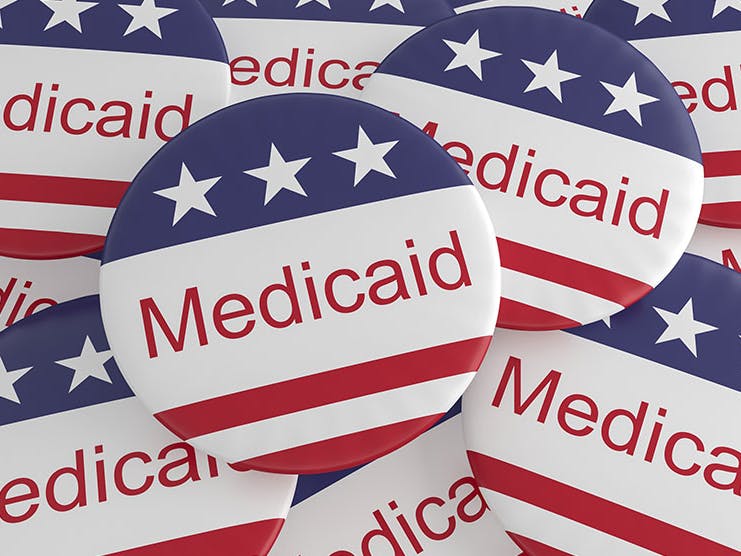
State-run Medicaid coverage varies according to where you live, as do eligibility requirements.
Medicaid covers a wide range of health care services. Though it is a state-level health insurance program, it is funded by state and federal taxes, and is federally required to cover hospital care, doctor visits, home health services, lab services, long-term care, and X-ray services. It also provides Early Periodic Screening Diagnosis and Treatment (EPSDT) services, which are comprehensive benefits for children.
Beyond this, coverage options vary depending on your state. Many states have opted to cover additional services, such as dental, prescription drug, and vision care.
Medicaid FAQ
Here are the answers to some common questions about Medicaid.
What is Medicaid?
Medicaid is a public health insurance program meant for low-income individuals. It covers 1 in 5 Americans and is the main source of long-term care services in the U.S. The program limits out-of-pocket costs and covers a range of services, allowing enrollees access to affordable health care.
Is Medicaid a state or federal program?
A federal-state partnership, Medicaid is held to federal requirements, with states in charge of determining covered services and populations, as well as how hospitals and physicians are paid. The program is financed jointly, and the federal government matches state spending. Federal contribution ranges from a minimum of 50 percent to nearly 75 percent in some states. This allows Medicaid to cover necessary services, while also leaving some wiggle room in the event of economic shifts or public health emergencies
Who qualifies for Medicaid?
Eligibility requirements for Medicaid vary from state to state, however you must be a U.S. citizen, U.S. national, or provide satisfactory immigration status to receive full benefits. The primary factor states look at for Medicaid eligibility is income level, but they also consider age, disability, and family size.
Medicaid covers nearly half the births in a given state, as well as almost half of all children with special health care needs and nonelderly adults with disabilities. People with disabilities and seniors account for 1 in 4 Medicaid beneficiaries. Remember that some states may be stricter about eligibility requirements. You can learn about your state's Medicaid program here.
How is Medicaid different from Medicare?
People often confuse Medicaid and Medicare for each other, or assume that they are the same thing. Though both are government-run health care programs, they are two entirely different entities.
Original Medicare has two parts; Part A covers inpatient hospital care and Part B covers outpatient services such as doctor visits, mental health care, and lab services. There is also Medicare Part C (Medicare Advantage), which is provided by private insurance companies and offers Part A and Part B coverage through a single plan. Many also offer additional coverage, such as dental, hearing, and vision services. Medicare Part D is Medicare's prescription drug coverage and is the only way to get medications covered by Medicare if your Part C plan does not include it. While you may qualify for premium-free Part A, Parts B, C, and D come with coinsurance, copays, deductibles, and premiums.
The true difference between Medicaid and Medicare is in how you qualify. Though Medicaid requirements can vary, requirements for Medicare are always the same: you must be at least 65, have a disability, or have End-Stage Renal Disease (ESRD). If you meet the requirements for each program, you are considered dual eligible and can enroll in both.
Do you need Medicare if you have Medicaid?
It is wise to enroll in Medicare once you are eligible, even if you already have Medicaid. Being eligible for Medicare doesn't mean losing Medicaid, and waiting to sign up can result in lifelong late fees. As long as your income stays within your state's Medicaid guidelines, you can have both.
Remember that, if you do have both programs, Medicare becomes the primary insurance, with Medicaid covering costs only after Medicare has paid or if Medicare will not pay. Combining the two also means that Medicaid pays your Part B premiums, helps to coordinate care, and provides financial assistance for health care. Medicaid also allows you access to dental, vision, and transport coverage; services not covered by Medicare outside of an Advantage plan.
Additional resources
How Medicare Differs from Medicaid
Internal Website Link
Does Medicaid Cover Root Canals?
Internal Website Link
If I Have Medicaid Do I Need Medicare?
Internal Website Link
Does Medicaid Cover Funeral Expenses?
Internal Website Link
Does Medicaid Cover Lasik?
Internal Website Link



